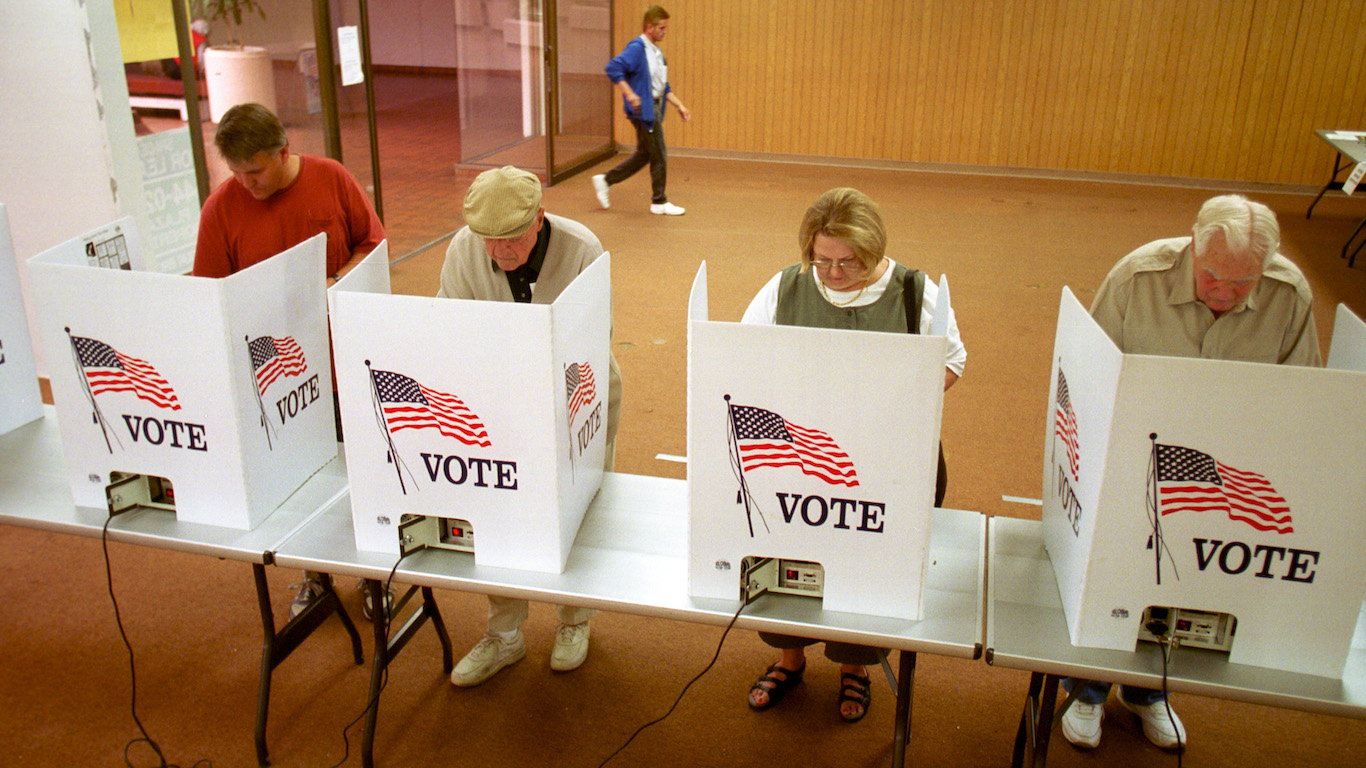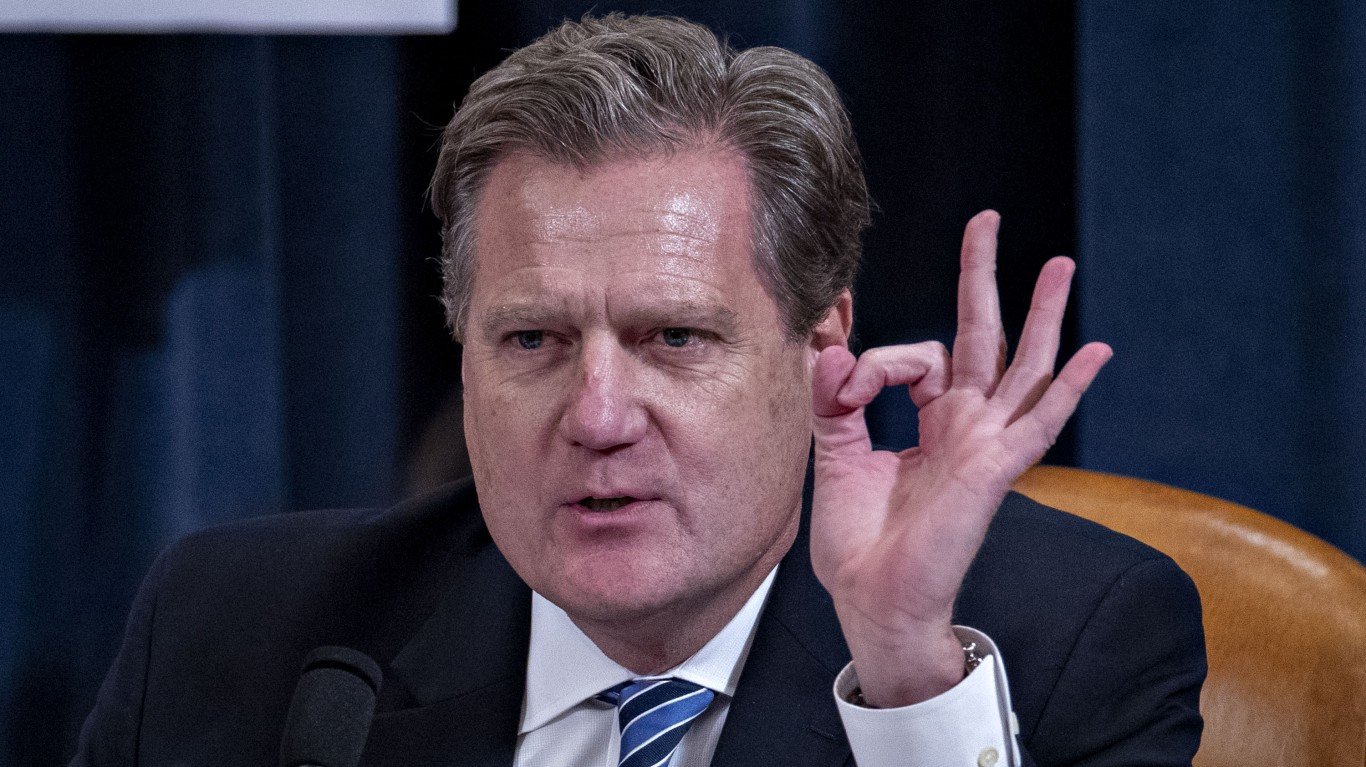

President Donald Trump is ending a historically unpopular presidency with the lowest record approval rating during his term, at 34%, according to Gallup. Only Harry S. Truman and Richard Nixon, who resigned in disgrace over Watergate, had lower approval ratings.
To mark Inauguration Day, 24/7 Wall St. reviewed presidential approval ratings by Gallup for every president since the company’s polling began in 1935. Polling data excludes presidents Franklin Delano Roosevelt and John F. Kennedy because they died in office.
An impartial public polling is an indicator of a free society in which nongovernment organizations can collect and publish information about citizens’ views on issues. Opinion polls are supposed to represent the opinions of a population. A president’s approval rating is determined by conducting a survey that includes a series of questions asked to people who are selected randomly.
The final approval rating of a president is generally lower than his average approval rating of the way he did his job throughout his time in office. From tax cuts to natural disasters and U.S.-led wars abroad, final ratings of presidents are often shaped by key historical events in their presidency. President Richard Nixon’s final approval rating of 24%, the lowest final rating of a sitting president in Gallup’s history, was the result of the Watergate scandal. Trump’s popularity suffered mostly because of his handling of the COVID-19 pandemic.
In some cases, former presidents are able to restore some of their lost popularity with work they do after their term is over — here is what every American president did after leaving the White House.
Click here to see the final approval rating of every president since Harry Truman
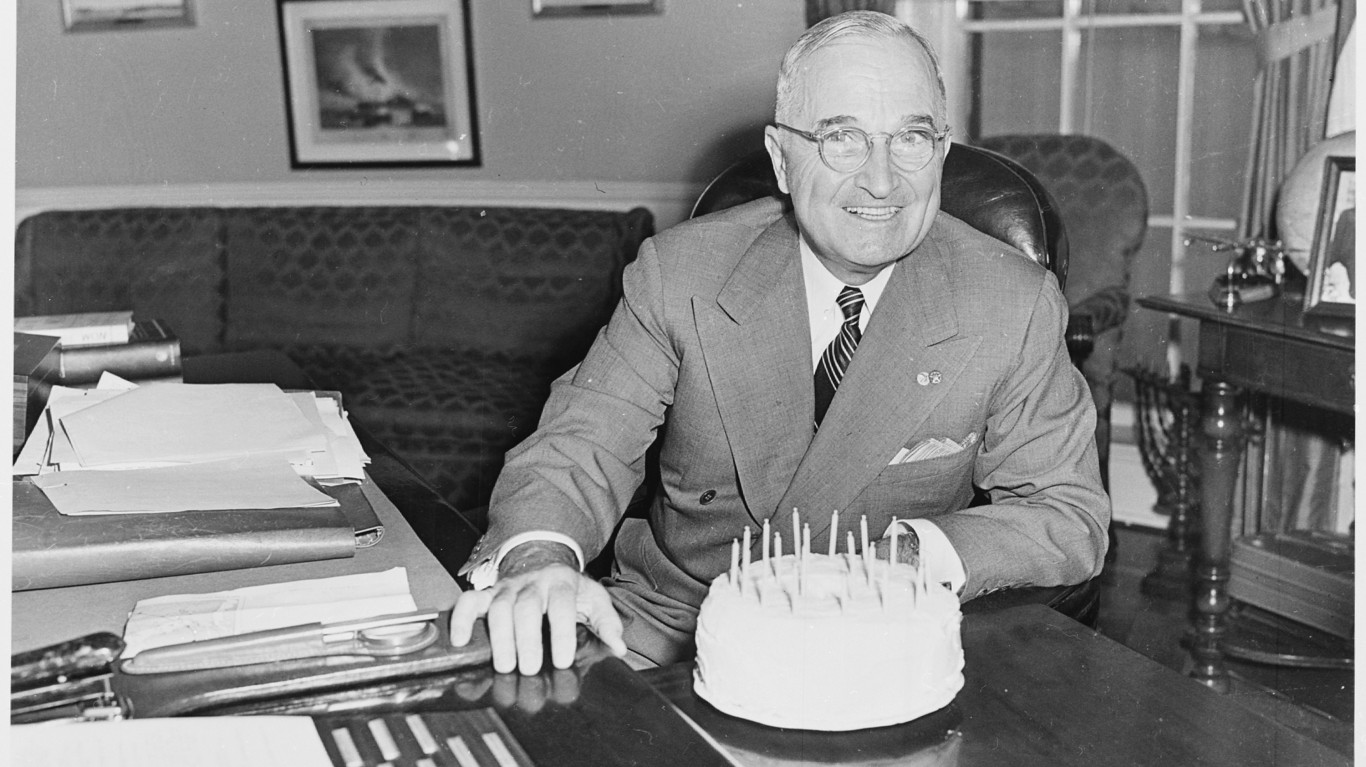
Harry S. Truman
> Years in office: 1945-1953
> Approval rating last week of office: 32% (Overall average: 45%)
> Disapproval rating last week of office: 56%
Harry Truman became president after President Franklin Delano Roosevelt died in office three months into his fourth term in 1945 from cerebral hemorrhage. Truman’s eight years in office were marked by the end of World War II, the president’s decision to use the atomic bomb (of which he knew nothing before taking office) against Japan, and United State’s help in rebuilding Europe after the war. In his second term, Truman presided over the Korean War.
Truman’s decision to send American troops to fight in the Korean War — along with Sen. Joseph McCarthy’s accusations of communists having infiltrated the U.S. government — hurt his popularity. The president left office with just 32% of Americans approving of his job as president, according to a Gallup poll conducted in mid-December in 1952.
[in-text-ad]
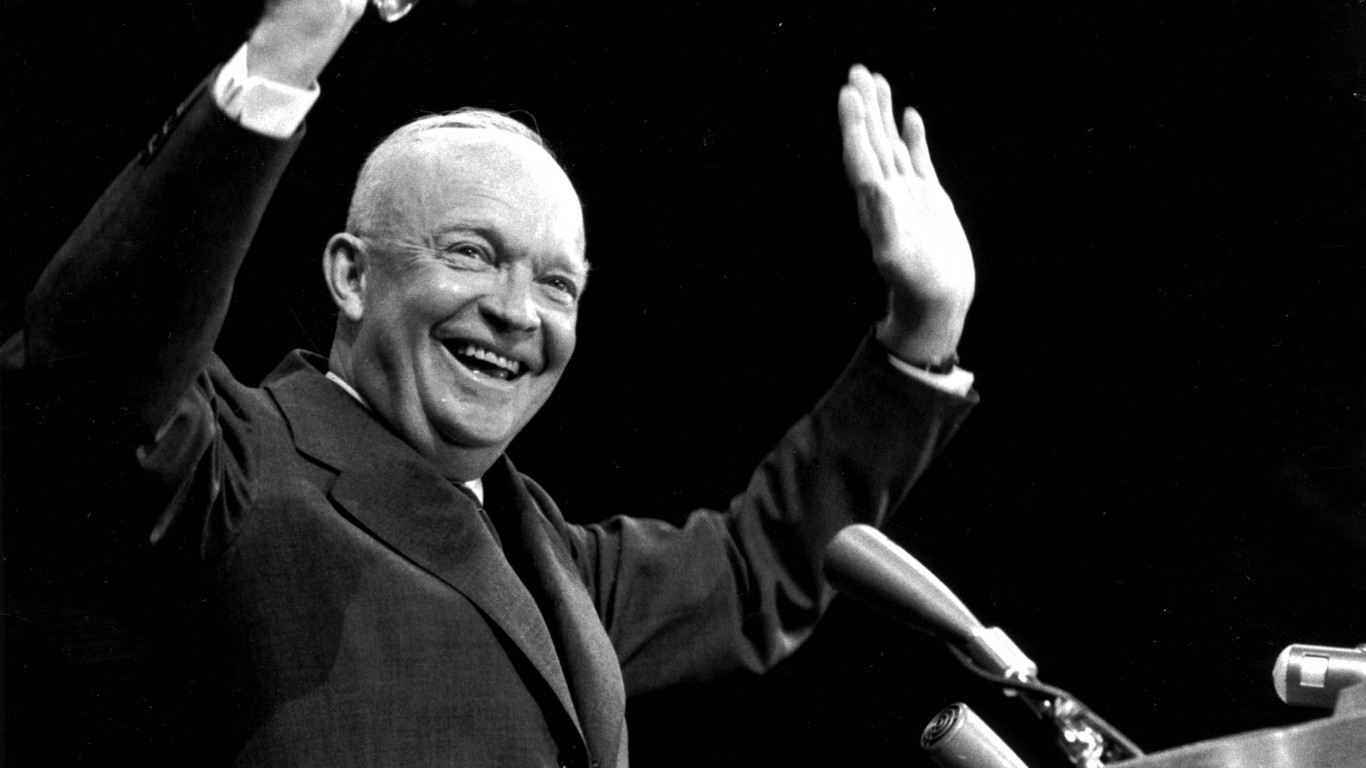
Dwight D. Eisenhower
> Years in office: 1953-1961
> Approval rating last week of office: 59% (Overall average: 65%)
> Disapproval rating last week of office: 28%
Dwight D. Eisenhower led the Allied forces to victory in World War II. He was among the most popular and well-respected people in the country at the time he had assumed the presidency. During his two terms in the White House, Eisenhower managed to ease tensions with the Soviet Union over the threat of nuclear weapons, effectively ending the Korean war by obtaining a truce. He also strengthened Social Security, raised the federal minimum wage, and helped discredit McCarthyism.
Eisenhower was still popular at the end of his term. His popularity, however, suffered after his handling of the enforcement of racial desegregation of schools after the Supreme Court ruled the practice unconstitutional in the 1954 case of Brown v. Board of Education of Topeka.
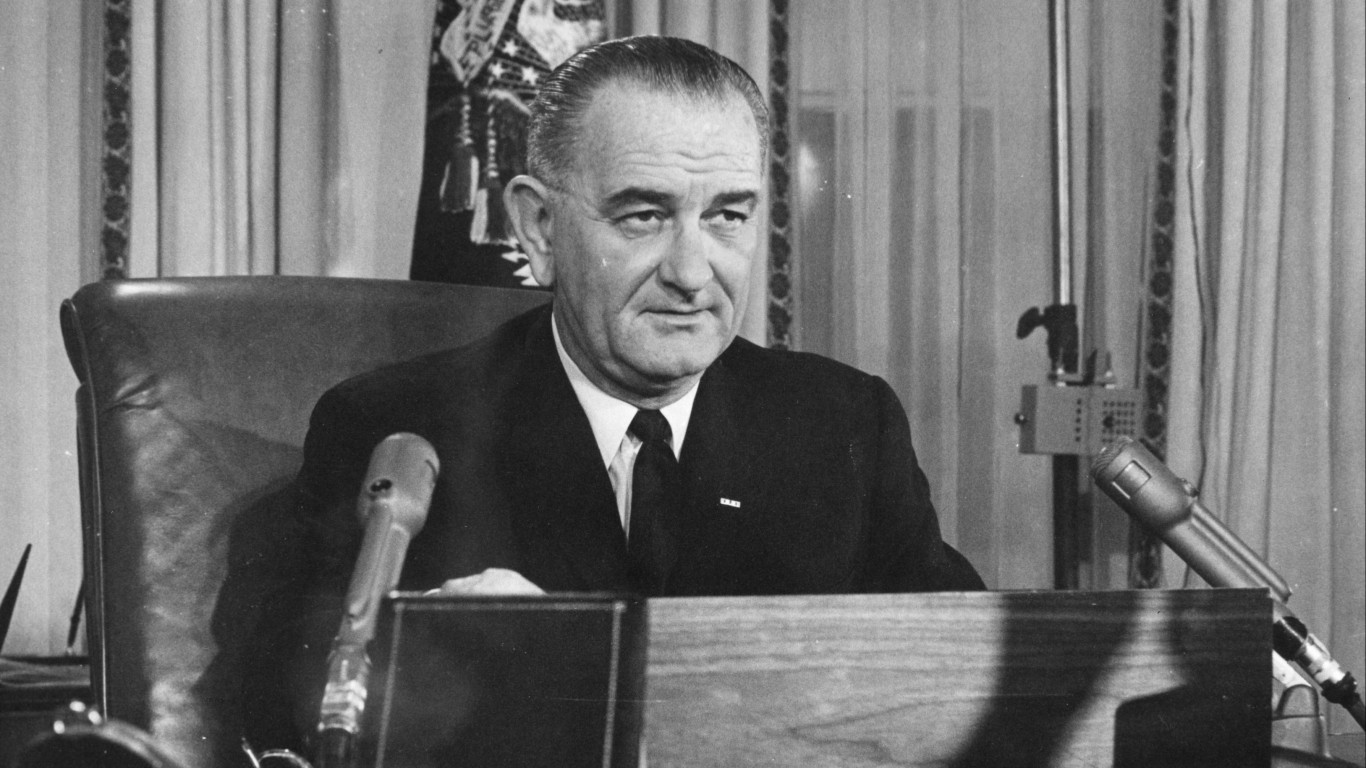
Lyndon B. Johnson
> Years in office: 1963-1969
> Approval rating last week of office: 49% (Overall average: 55%)
> Disapproval rating last week of office: 37%
Lyndon B. Johnson was sworn in as president in 1963 after President John F. Kennedy was assassinated. LBJ is remembered for his vision of creating a “Great Society,” which included decalring a war on poverty and working to end racial discrimination. Johnson signed the Voting Rights Act in 1965, which banned racial discrimination in voting, and the Civil Rights Act in 1964, which outlawed discrimination based on race, color, religion, sex, and national origin.
Johnson’s domestic policies made him popular, but his last years in office were largely defined by his foreign policies, particularly the Vietnam War, which saw anti-war protests across the country. Johnson escalated U.S. military involvement in Vietnam, which was in stalemate at the end of Johnson’s term in 1969.
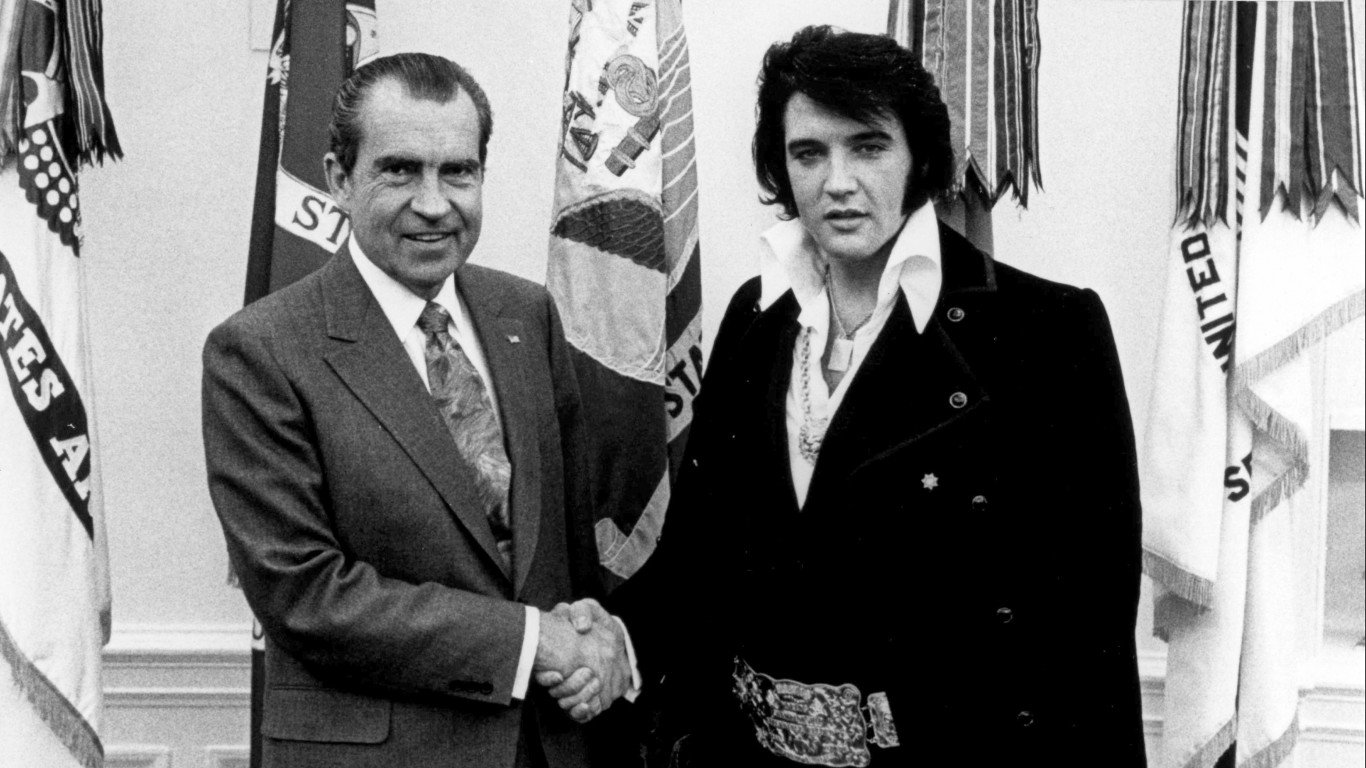
Richard Nixon
> Years in office: 1969-1974
> Approval rating last week of office: 24% (Overall average: 49%)
> Disapproval rating last week of office: 66%
President Richard Nixon left office with the lowest approval rating since Gallup had started conducting the job approval polls. Nixon, the only president in history to have resigned from office, stepped down in the middle of his second term in 1974 over his involvement in the Watergate scandal — the covering up of illegal spying by members of his reelection campaign on the Democratic National Committee.
Before the Watergate scandal, Nixon polled at around 60% due to his efforts to establish diplomatic ties with China and the Soviet Union — Nixon was the first sitting president to visit the USSR — as well as withdrawing American troops from the highly unpopular Vietnam War. After Watergate, Nixon’s approval rating plummeted.
[in-text-ad-2]
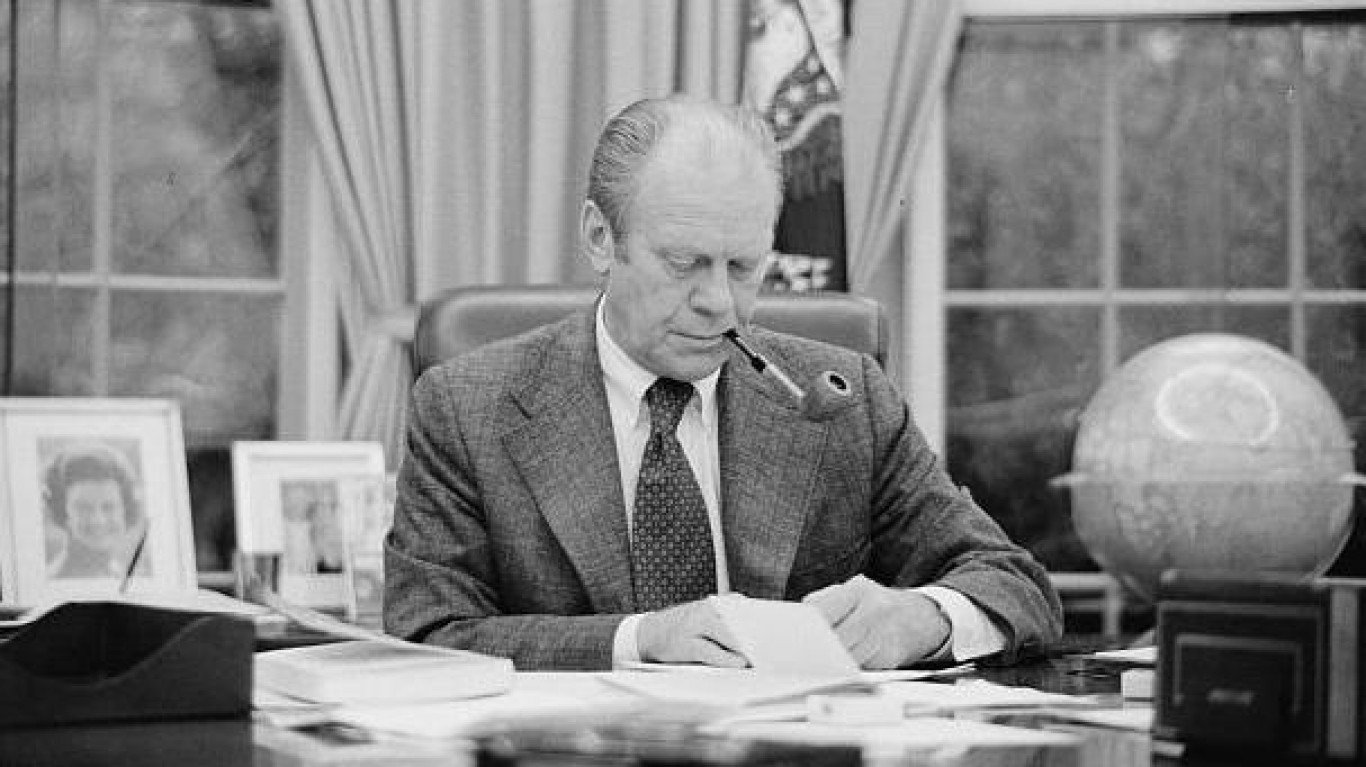
Gerald R. Ford
> Years in office: 1974-1977
> Approval rating last week of office: 53% (Overall average: 47%)
> Disapproval rating last week of office: 32%
President Gerald R. Ford, the only U.S. president never to win a national election, is mostly remembered for helping to restore confidence in the federal government after the Watergate scandal. His decision to pardon Nixon for any crimes he may have committed as president was controversial and may have cost him a second term. He lost the 1976 presidential election to Jimmy Carter.
During his two years in office, Ford had to deal with an energy crisis, a struggling economy, high inflation, and high unemployment. Ford, a Republican, was not getting along with the Democratic Congress and vetoed dozens of bills that would have increased the budget deficit.
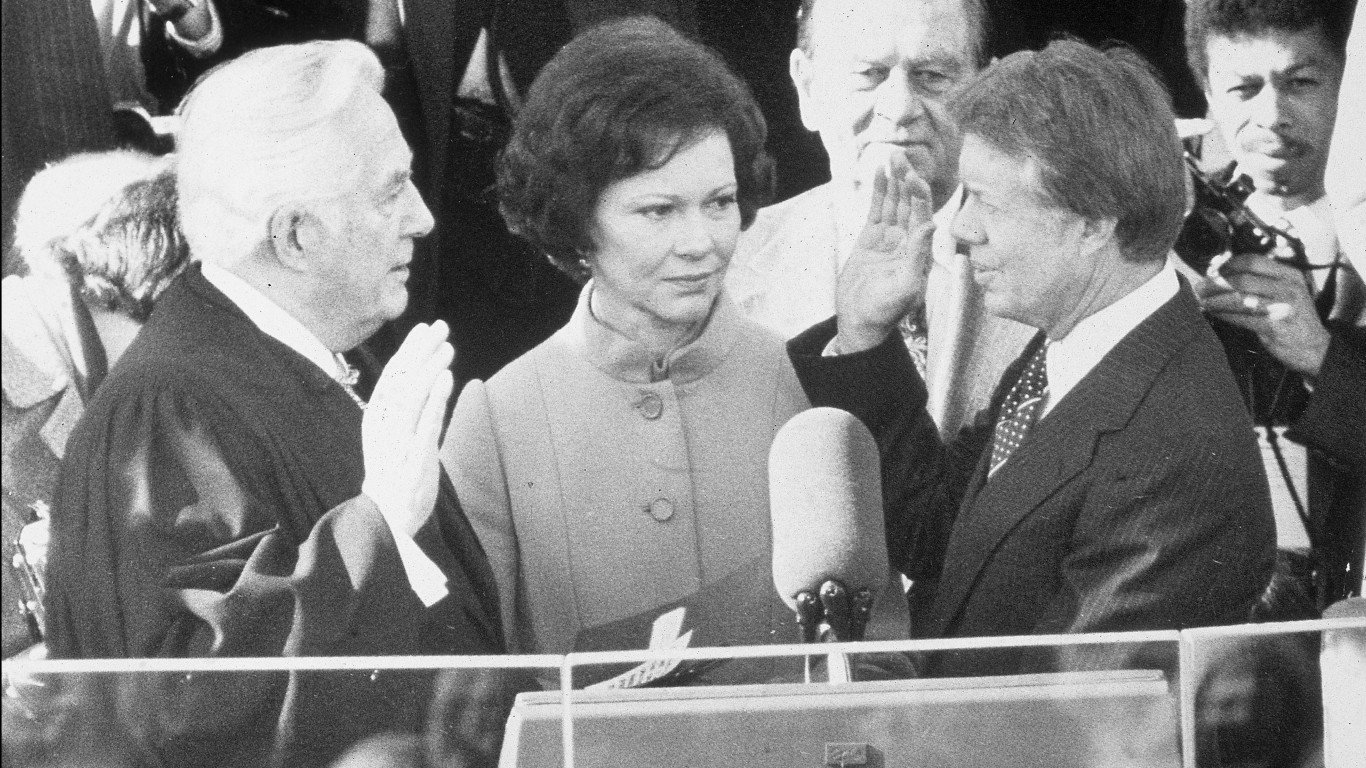
Jimmy Carter
> Years in office: 1977-1981
> Approval rating last week of office: 34% (Overall average: 46%)
> Disapproval rating last week of office: 55%
Jimmy Carter, the longest-living president, had a successful career as a diplomat after leaving the White House in 1981. He won the Nobel Peace Prize in 2002 “for his decades of untiring effort to find peaceful solutions to international conflicts.” His four years in office, however, were marred by high inflation, an energy crisis (oil prices skyrocketed from $13 a barrel to over $34 a barrel during his term), high unemployment, and, towards the end, the Iran hostage crisis.
Many of Carter’s proposals, including a welfare reform, were blocked by Congress. Carter enjoyed more success in his foreign policies. The former president was credited with helping Egypt and Israel reach a peace agreement that ended their hostile relationships. He also helped open full diplomatic relations with China and improve relations with the Soviet Union.
[in-text-ad]
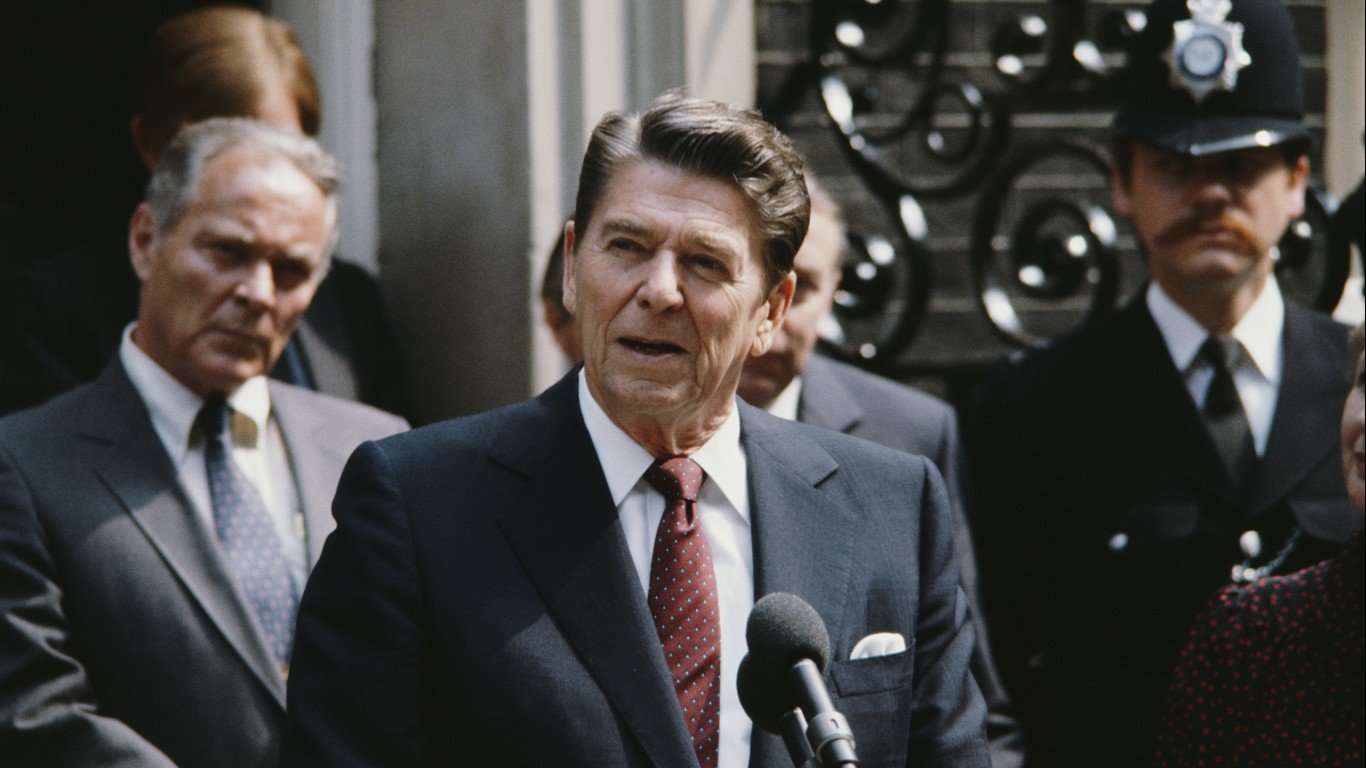
Ronald Reagan
> Years in office: 1981-1989
> Approval rating last week of office: 63% (Overall average: 53%)
> Disapproval rating last week of office: 29%
Ronald Reagan, a former actor and governor of California nicknamed “the Great Communicator” for his public speaking skills, was among the most popular two-term presidents in U.S. history. During his eight years at the White House he cut income taxes by 23%, increased defense spending by 20% between 1982 to 1983, and negotiated an agreement with the Soviet Union to reduce nuclear arms. Reagan is also credited for helping to end the Cold War.
Reagan won reelection in 1984, carrying 49 out of 50 states (he only lost Minnesota and D.C.) and receiving 525 out of 538 electoral votes, the biggest win ever by a presidential candidate. At the end of Reagan’s term, the U.S. had the longest period of prosperity without recession or depression.
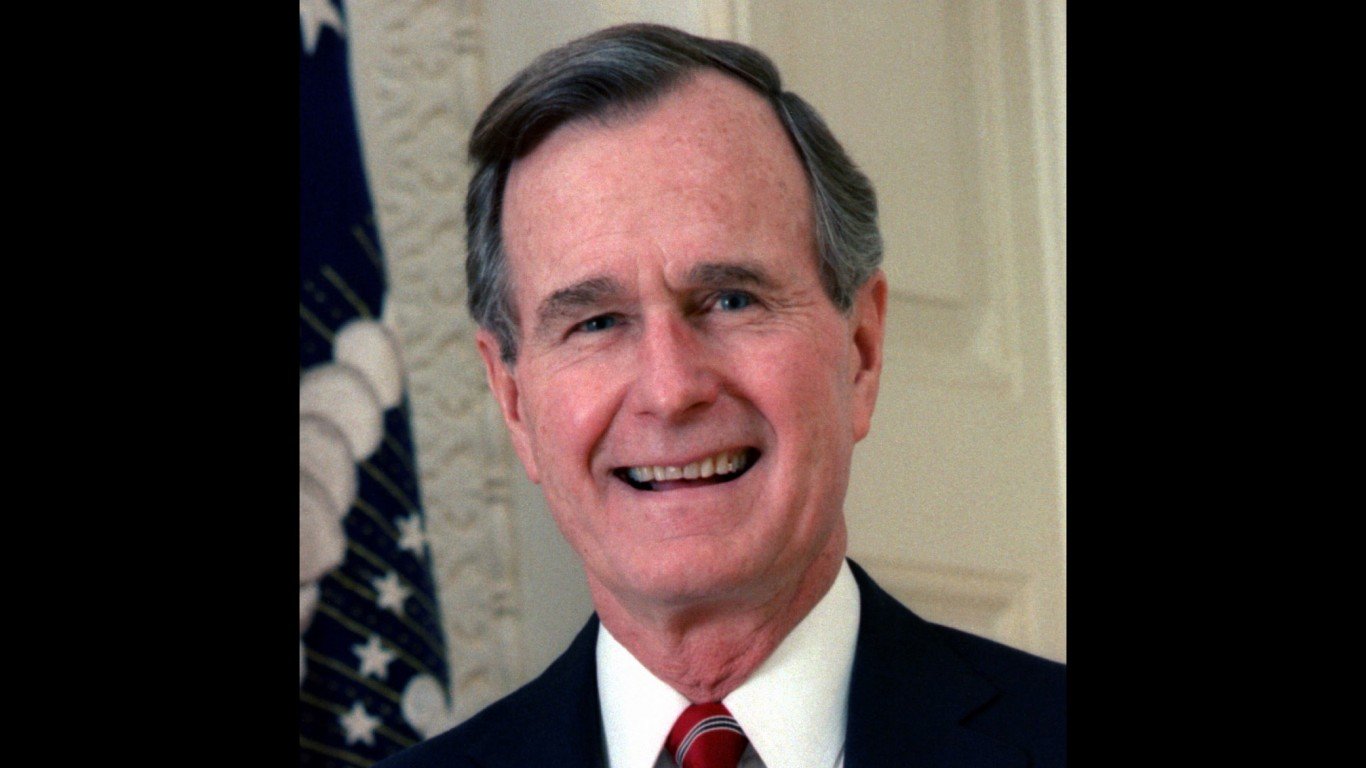
George H. W. Bush
> Years in office: 1989-1993
> Approval rating last week of office: 56% (Overall average: 61%)
> Disapproval rating last week of office: 37%
George H.W. Bush, who was a two-term vice president under Ronald Reagan, was a one-term president. His four years at the White House were marked by successful military operations against Panama and Iraq but also by an economic recession at home, which ultimately cost him reelection in 1992.
Bush famously declared at the 1988 National Republican Convention before accepting the party’s nomination for president that he would not raise taxes. However, defying conservatives, he broke his “read my lips: no new taxes” promise in 1990 to broker a budget compromise.
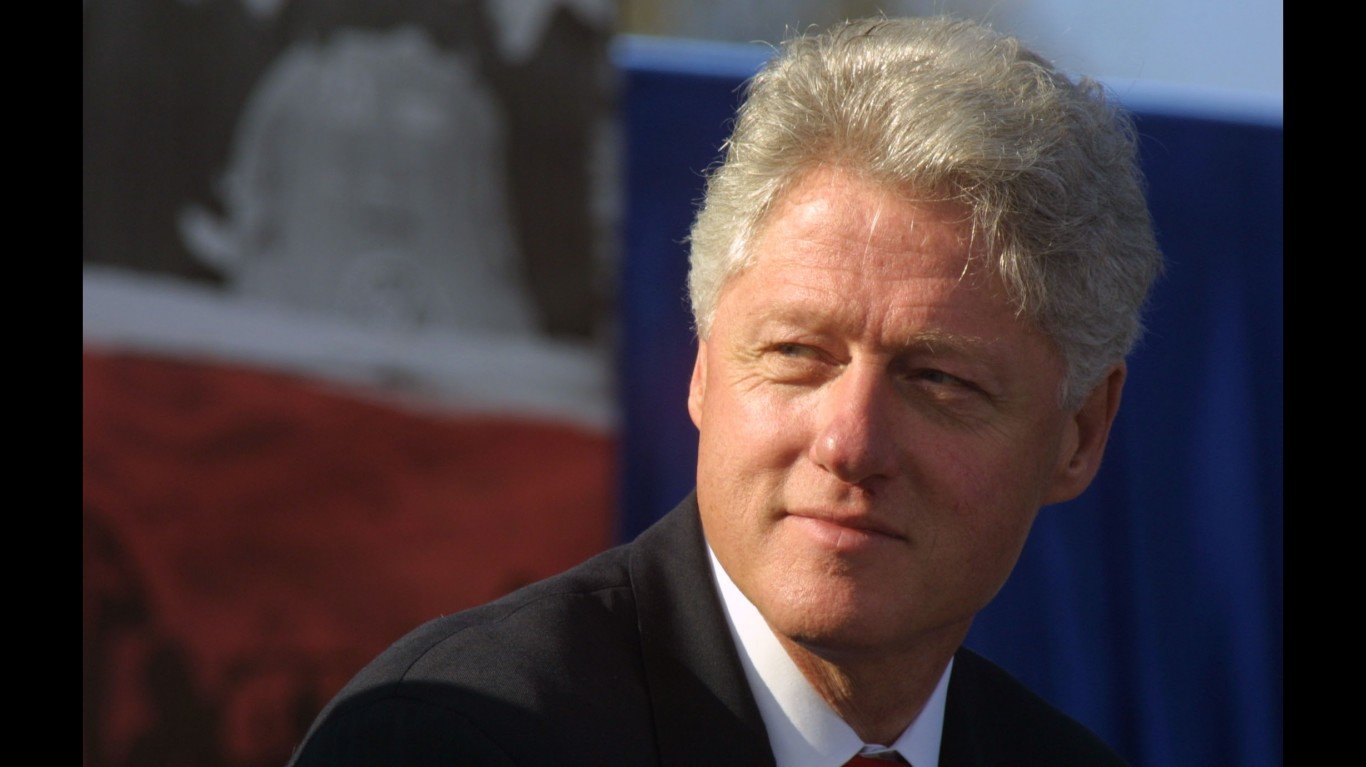
William J. Clinton
> Years in office: 1993-2001
> Approval rating last week of office: 66% (Overall average: 55%)
> Disapproval rating last week of office: 29%
Bill Clinton was the most popular outgoing president, based on Gallup’s approval ratings polls. Clinton’s time in office between 1993 and 2001 was marked by historic economic growth with low unemployment and a budget surplus. Clinton is also remembered for appointing several women to influential positions, including Janet Reno, who became the first woman to serve as attorney general, Madeleine Albright, the first female secretary of state, and Ruth Bader Ginsburg, the second female justice in the Supreme Court.
Clinton was impeached in 1998 on charges of lying under oath and obstruction of justice related to a sexual relationship he had with Monica Lewinsky, a White House intern at the time, but he was acquitted.
[in-text-ad-2]
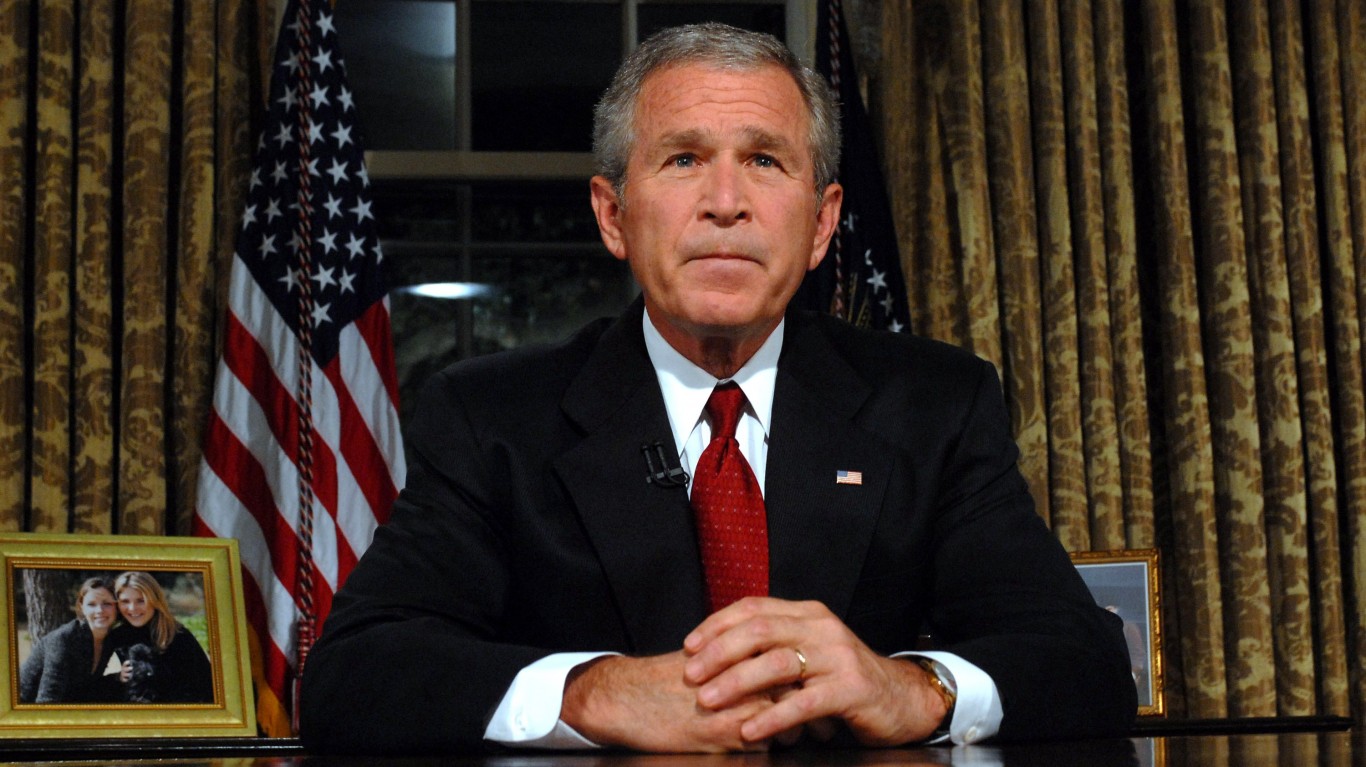
George W. Bush
> Years in office: 2001-2009
> Approval rating last week of office: 34% (Overall average: 49%)
> Disapproval rating last week of office: 61%
George W. Bush narrowly won the 2000 presidential elections, defeating Al Gore, who served as vice president under Bill Clinton. Bush’s term was largely shaped by the 9/11 terrorist attacks. Bush declared a war on terror, formed the Department of Homeland Security, and authorized a U.S.-led war in Afghanistan and the invasion of Iraq.
Bush lost much of his popularity during his second term due to his administration’s widely criticized response to Hurricane Katrina, which devastated the Gulf Coast region, and the revelation that Bush’s claims about Iraq’s weapons of mass destruction were misleading.

Barack Obama
> Years in office: 2009-2017
> Approval rating last week of office: 59% (Overall average: 48%)
> Disapproval rating last week of office: 37%
Barack Obama was the first African American to be president of the United States. His signature legislative achievement during his eight years at the White House is the Affordable Care Act, commonly known as Obamacare, which was signed into law in 2010. The law, which considerably increased the share of Americans with health insurance, was challenged at the Supreme Court several times. It is still a deeply divisive issue.
Towards the end of his presidency, Obama sought to improve relations with Cuba and became the first sitting president to visit the Communist island since 1928. He signed a historic agreement between the U.S., the other four permanent members of the U.N. Security Council, the European Union, and Iran to prevent the acquisition of nuclear weapons.
[in-text-ad]

Donald Trump
> Years in office: 2017-2021
> Approval rating last week of office: 34% (Overall average: 41%)
> Disapproval rating last week of office: N/A
President Donald Trump is leaving office with an approval rating of 34%, the lowest rating of his presidency, according to a Gallup poll conducted between Jan. 4-15. His presidency already has the weakest overall approval rating of any of his predecessors since the survey began.
Support for Trump has started to fall below 40% in June amid racial justice protests after the death of George Floyd who was killed by police during an arrest, and due to criticisms over Trump’s handling of the COVID-19 pandemic. Trump’s final two weeks in office have been marked by a deadly insurrection at the Capitol. Congress impeached the president, again, for inciting the insurrection. Trump is the only president to be impeached twice. Around the presidential election in November, Trump’s approval rating was 46%. The 12 percentage points drop in popularity between Election Day and his last week in office is the biggest drop in the poll’s history.
Sponsored: Want to Retire Early? Here’s a Great First Step
Want retirement to come a few years earlier than you’d planned? Or are you ready to retire now, but want an extra set of eyes on your finances?
Now you can speak with up to 3 financial experts in your area for FREE. By simply clicking here you can begin to match with financial professionals who can help you build your plan to retire early. And the best part? The first conversation with them is free.
Click here to match with up to 3 financial pros who would be excited to help you make financial decisions.
Thank you for reading! Have some feedback for us?
Contact the 24/7 Wall St. editorial team.


